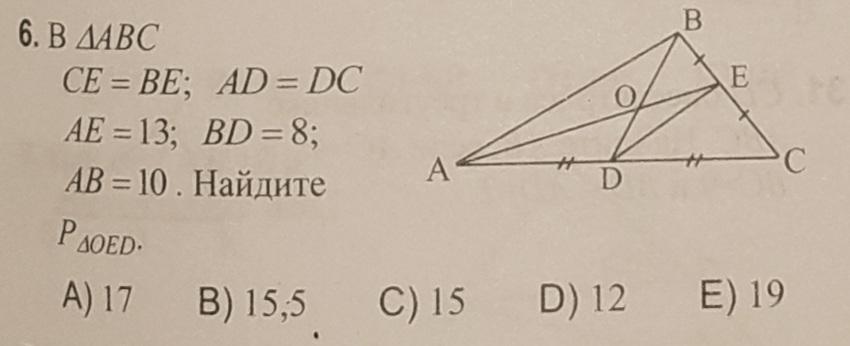Предмет: Математика,
автор: osoeiw8rw7eu
Задача про треугольник
Приложения:

Ответы
Автор ответа:
1
Ответ:
D) P(△OED)=12 ед
В △АВС: CE=BE, AD=DC; AE=13; BD=8; AB=10. Найти: P(△OED).
Пошаговое объяснение:
- Медиана треугольника - отрезок, соединяющий вершину треугольника с серединой противолещащей стороны.
Так как CE=BE, AD=DC, то AE и BD - медианы △АВС.
- Медианы треугольника пересекаются в точке, которая делит их в отношении 2:1, считая от вершины.
BO : OD = 2 : 1, следовательно OD=⅓•BD.
AO : OE = 2 : 1, следовательно OE=⅓•AE.
- Средняя линия треугольника - это отрезок, соединяющий середины двух сторон.
- Средняя линия параллельна третей стороне, а её длина равна половине длины этой стороны.
E -середина BC, D - середина AC. Следовательно DE - средняя линия △ABC.
DE=½•AB=½•10=5 ед.
- Периметр треугольника - это сумма всех его сторон.
P(△OED)=DE+OD+OE=DE+⅓•(BD+AE)=5+⅓•(8+13)=5+⅓•21=5+7= 12 ед
#SPJ1
Приложения:

Похожие вопросы
Предмет: Русский язык,
автор: Аноним
Предмет: Українська мова,
автор: NikaЕфросинина
Предмет: Қазақ тiлi,
автор: 11111209
Предмет: Окружающий мир,
автор: sasab
Предмет: Английский язык,
автор: sfigality